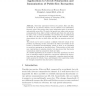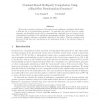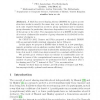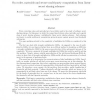CRYPTO
2005
Springer
14 years 8 months ago
2005
Springer
Broadcast encryption schemes allow a message sender to broadcast an encrypted data so that only legitimate receivers decrypt it. Because of the intrinsic nature of one-to-many comm...
CRYPTO
2005
Springer
14 years 8 months ago
2005
Springer
Secret-key agreement between two parties Alice and Bob, connected by an insecure channel, can be realized in an informationtheoretic sense if the parties share many independent pai...
CRYPTO
2005
Springer
14 years 8 months ago
2005
Springer
Abstract. Using a recent idea of Gaudry and exploiting rational representations of algebraic tori, we present an index calculus type algorithm for solving the discrete logarithm pr...
CRYPTO
2005
Springer
14 years 8 months ago
2005
Springer
We investigate methods for providing easy-to-check proofs of computational effort. Originally intended for discouraging spam, the concept has wide applicability as a method for co...
CRYPTO
2005
Springer
14 years 8 months ago
2005
Springer
The Full-Domain Hash (FDH) signature scheme [3] forms one the most basic usages of random oracles. It works with a family F of trapdoor permutations (TDP), where the signature of m...
CRYPTO
2005
Springer
14 years 8 months ago
2005
Springer
Abstract. Assuming an insecure quantum channel and an authenticated classical channel, we propose an unconditionally secure scheme for encrypting classical messages under a shared ...
CRYPTO
2005
Springer
14 years 8 months ago
2005
Springer
We present a constant-round protocol for general secure multiparty computation which makes a black-box use of a pseudorandom generator. In particular, the protocol does not requir...
CRYPTO
2005
Springer
14 years 8 months ago
2005
Springer
A black-box secret sharing scheme (BBSSS) for a given access structure works in exactly the same way over any finite Abelian group, as it only requires black-box access to group o...
CRYPTO
2005
Springer
14 years 8 months ago
2005
Springer
Error correcting codes and matroids have been widely used in the study of ordinary secret sharing schemes. In this paper, we study the connections between codes, matroids, and a s...
CRYPTO
2005
Springer
14 years 8 months ago
2005
Springer




